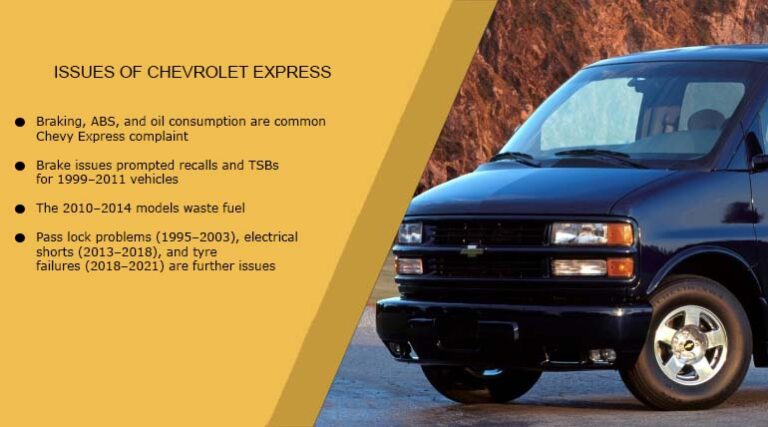Unveiling 9 Common Issues of Ford Transit You Better Know
The Ford Transit is a popular option among commercial vehicle owners and enthusiasts alike, with a reputation for adaptability, sufficient cargo capacity, and a pleasant driving experience. The Ford Transit, like any other vehicle, is not immune to mechanical troubles and problems. In this post, we will highlight 9 common issues of Ford Transit and give tips on how to properly handle them.
Summary
To summarize, the most prevalent issue with Ford Transit is a lack of power, which affects vehicles from 2014 to 2016. The 2015-2020 versions are prone to premature brake wear and driveshaft coupling failure. The air conditioner is also prone to failure, and engine banging is typical in the 2016 model.
1. Transmission Issues
The gearbox is one of the most often matters with the Ford Transit. Some owners have reported hard shifting, gear engagement delays, and transmission fluid leaks. Regular upkeep, such as substituting the transmission fluid and inspecting for any fluid leaks, may assist to minimize future problems. If you detect any strange transmission behavior, it is serious that a certified technician inspect it.
2. Electrical Malfunctions
Electrical difficulties may appear in a variety of ways, such as defective power windows, faulty sensors, or problems with the vehicle’s lighting. These problems are aggravating and might be caused by blown fuses, damaged wiring, or faulty components. If you have electrical problems, it is important to see a competent car electrician who can precisely identify and repair the issue.
3. Engine Performance Problems
Some Ford Transit owners have experienced engine performance difficulties, such as rough idling, low fuel economy, or power loss. These troubles might be caused by a number of sources, including blocked fuel injectors, malfunctioning spark plugs, or air intake issues. Regular engine maintenance and timely repairs may greatly enhance the vehicle’s overall performance and fuel economy.
4. Brake System Troubles
Brake-related issues are a serious safety risk that should never be neglected. Squealing brakes, a soft brake pedal, or grinding sounds may indicate worn-out brake pads or braking system faults. Immediate attention to brake issues may help to avoid accidents and expensive repairs in the long term. Regular brake checks and maintenance are critical to the vehicle’s and its passengers’ safety.
Read more about the throttle body issues of Ford-150, which is also a very commonly driven line-up of Ford.
5. Suspension and Steering Issues
Suspension and steering difficulties are indicated by a rough ride, excessive bouncing, or trouble turning. These problems might be caused by worn shocks or struts, faulty tie rods, or misaligned wheels. Ignoring these issues might result in more damage and jeopardize the vehicle’s control and stability. Regularly checking and aligning the suspension and steering system may assist to ensure a smooth and safe driving experience.

6. Exhaust System Failures
The exhaust system is critical in eliminating hazardous emissions while still preserving the vehicle’s performance. Rust and rust may wreak havoc on the exhaust system, causing leaks and strange sounds. Ignoring exhaust system issues may result in reduced fuel-economy and pollutants. Regular inspections and repairs may help to extend the life of the exhaust-system and maintain emissions under permissible levels.
Related article: The Most Recurrent Problems of Ford F-150 Raptor
7. Air Conditioning and Heating Malfunctions
A faulty air conditioning or heating system may be exceedingly unpleasant under harsh temperature conditions. Ford Transit owners have complained about poor ventilation, unusual scents, and a lack of temperature control. HVAC system problems may be caused by refrigerant leaks, defective compressors, or faults with the blower motor. To restore the system’s normal performance, professional diagnostics and repairs are required.
8. Door and Lock Mechanism Problems
The Ford Transit’s extensive usage in business settings may cause wear and tear on its doors and locks. Door handles, locks, and sliding systems might malfunction over time. lubrication and adequate maintenance help avoiding such issues. If you have trouble opening or shutting the doors, it is grave that you resolve the matter as soon as possible to eliminate any security problems.
9. Fuel System Hiccups
Some Ford Transit owners have reported fuel system difficulties such as gasoline leakage, a defective fuel pump, or fuel gauge issues. Fuel system problems may limit fuel economy and, in severe circumstances, represent a fire risk. Regularly examining the fuel system and swiftly repairing any leaks or malfunctions will save money on repairs and maintain the safety of the vehicle.
Ford Transit Worst Years
Ford Transit is a tough and reliable van with a good reputation in the marketplace. If properly maintained, it will serve approximately 8-10 years. The Ford Transit is one of the original vehicles on the road. It has been in existence around 1965. Inevitably it has had many issues.
The 2016 Ford Transit is the most disastrous model year. This model year has the three most often reported issues: AC not functioning, brake wear, and power loss. This year also had the most recalls; yet, the parent firm did not address various concerns.
Even at its lowest, the Ford Transit had a number of contemporary amenities that other vans missed. It has given him a name in the corporate world. It is also a low-cost car to maintain.
Ford Transit Best Years
The Ford Transit’s finest year is 2020. This model year has a few small problems. However, the most recent generation offers some of the greatest features Ford Transit has offered in its 58-year history.
Conclusion
To conclude, the Ford Transit is a dependable and commonly used commercial vehicle, but like with any vehicle, it may develop mechanical issues with time. Being aware of these typical problems and having a proactive approach to maintenance may considerably lessen the risk of catastrophic problems and breakdowns occurring. Regular inspections, timely repairs, and obtaining expert help when needed are critical to keeping your Ford Transit operating smoothly and safely on the road.

